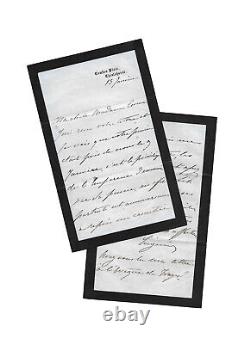
- Homepage
- Author
- Alfred Bruneau (3)
- Beydts (louis) (4)
- Camille Mauclair (3)
- Charles De Gaulle (3)
- Charles Monselet (3)
- Chateaubriand (5)
- Colette (3)
- Ernest Daudet (3)
- Eugène Labiche (3)
- Jean Couty (3)
- Jean-léon Gérôme (5)
- Louise Read (4)
- Marcel Proust (5)
- Paul Chabas (4)
- Paul Meurice (3)
- Proust (3)
- Roger Martin Du Gard (4)
- Salomon Reinach (3)
- Sully Prudhomme (7)
- Violette Leduc (4)
- Other (4028)
- Binding
- Era
- 18th Century (11)
- 1900 To 1960 (63)
- 1930s (4)
- 1960s (5)
- 1970s (7)
- 19th (5)
- 19th Century (48)
- 20th Century (15)
- Beautiful Era (12)
- Belle Epoque (49)
- First Empire (9)
- Nineteenth (19)
- Nineteenth Century (11)
- Post-war (23)
- Restoration (17)
- Revolution (4)
- Roaring Twenties (28)
- Second Empire (21)
- Second World War (6)
- World War Ii (9)
- Other (3737)
- Language
- Region
- Subject
Empress Eugénie / Signed Autograph Letter / Death of Napoleon III / Victoria



Handwritten letter signed "Eugénie" to Hortense Cornu [Camden Place, Chislehurst] January 13, 1875, 8 pages. A few minor ink smudges, otherwise in perfect condition.
Long and important letter from the Empress, written four days after the second anniversary of the death of Napoleon III. She painfully mentions the exhumation of the emperor's remains to be placed in the red Aberdeen granite sarcophagus, offered by Queen Victoria. I received your letter and I see that your thoughts were with us on January 9 [anniversary of the emperor's death].
It is the emperor's privilege to move people with his thoughts; indeed everywhere this anniversary has taken on a current character and everyone thought that they owed more than just a memory to this great memory. We had, here, a very touching ceremony, he was placed in the sarcophagus that the Queen [Victoria] had made for him; I watched hidden from everyone, and I can assure you that seeing him taken away, it felt like my heart was being ripped out; is this his final resting place?
I cannot believe it, but it seems to me that I will never be able to return without him! When I was in France I remember telling the Emperor, 'I only feel like a foreigner on the day of the dead, everything I love, thank God, is alive, and on that day when everyone goes to visit the dead I realize that I have nothing under the ground.' Today, on the contrary, if I had to return to France without him, I would always feel like a foreigner! What a strange fate that the most French hearts, the Napoleons, all have until now been laid to rest in a foreign coffin, two English! Alas, I cannot speak to you of anything else today.
My son [the Prince Imperial] continues to work. May God allow him to finish his studies, I fear nothing more than useless agitations; everything seems to be preparing for his future! But what a difficult task he has ahead of him!
When will the people understand the difference between those who love them and those who exploit them! My poor and dear Emperor wore himself out with toil, and no one will ever guess the secret pains of this three-year martyr!
Alone, he proposed this divine emanation, the forgiveness of insults, and only God knows to what harsh trials he was subjected. My health is quite good but I cannot bring myself to go out, the days pass quickly enough. My son sends you all his memories of friendship and believe in all my affectionate feelings. Eugénie Have you read my letter to the Bishop of Troyes? The sincere friendship that bound Queen Victoria and the imperial couple was born in 1855 during the alliance between Great Britain and France against Russia, during the Crimean War. This friendship stood the test of time and the vicissitudes of French foreign policy, which led the imperial couple to find exile in England after the fall of the Second Empire in September 1870. In a final tribute to the late emperor, Victoria had his remains transferred to a red Aberdeen granite sarcophagus, where he still rests today. Upon reading this letter, Eugénie, it seems, could not contain her emotions, "hidden [from] everyone." Eugénie mentions at the end of the letter her son the Prince Imperial who, in January 1875, left Woolwich School with the rank of officer in the British army. Three years later, to combat the monotony of exile and to prove his military talents, he enlisted, despite his mother's resistance, in the ranks of the British army. He went to southern Africa to suppress a Zulu revolt, before falling into an ambush, under their arrows, on June 1, 1879. She was the granddaughter of a chambermaid of Hortense de Beauharnais, mother of the future emperor. Raised near him, she wielded great influence for a long time by encouraging him towards politics. She brought him books in the prison of Ham and took notes for his studies.Erudite, with a taste for archaeology, she published her own works of history and literature, and held a popular salon. A republican, she nevertheless distanced herself from Louis-Napoleon after the December 1851 coup d'état, and opened a salon to the enemies of the Empire. She, however, reconciled with the emperor after the campaign in Italy, and was once again admitted into his familiarity in 1862.
Born Hortense Lacroix, she married the painter Sébastien Cornu in 1834. She died in poverty in Longpont-sur-Orge on May 16, 1875. Formerly in the collection of Jean-Claude Lachnitt.
